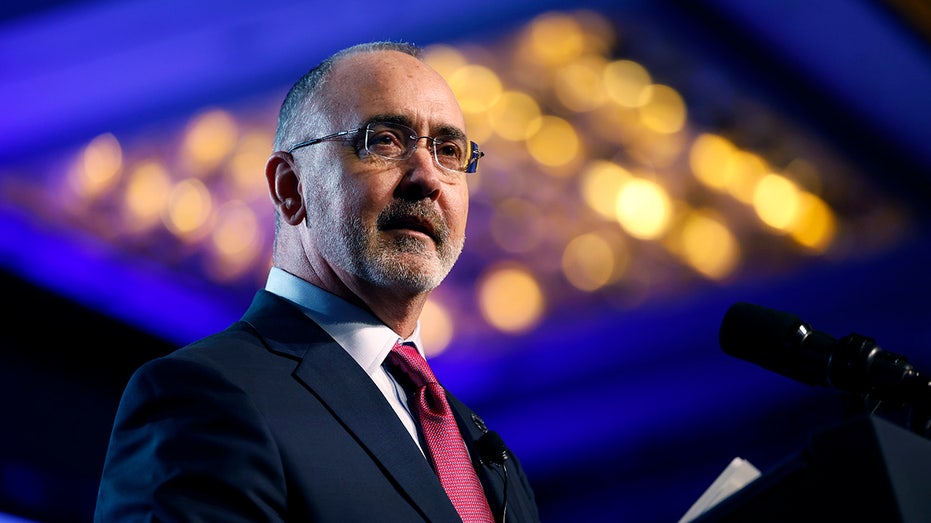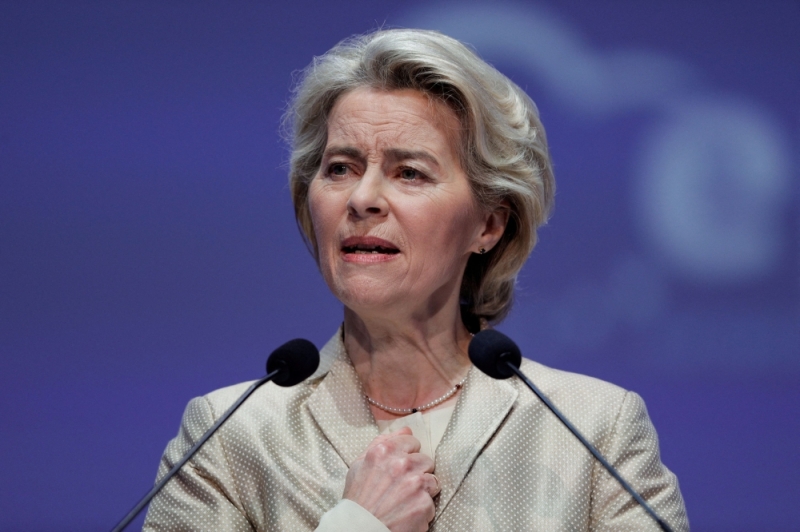By Lydia Moynihan
Published March 7, 2024, 4:08 p.m. ET
House committee votes unanimously to pass bill that would force ByteDance to sell TikTok
A billionaire megadonor is “bullying” members of Congress by threatening to stop funding them if they back a bill to order TikTok’s Chinese parent to sell the app, The Post has learned.
Hedge fund manager Jeff Yass is personally calling Republican members of the House to try to halt legislation which would force ByteDance to divest itself of the app, putting it in US hands instead.
His fund has a $33 billion stake in the Chinese company.
The bill, known as the Protecting Americans From Foreign Adversary Controlled Applications Act, was being marked up Thursday.

TikTok’s fate is once again imperiled as a bill to ban the app gains momentum.
REUTERS
It would force ByteDance to either sell TikTok to an American company in 6 months or be banned entirely.
It was jointly drawn up by Rep. Mike Gallagher, the chair of the House select committee on the Chinese Communist Party, and the Democratic ranking member, Rep. Raja Krishnamoorthi.

Bill that would force ByteDance to sell TikTok clears House panel unanimously
Yass is a Republican megadonor who has funneled $130 million since 2020 into PACs and a right-of-center think tank, The Club for Growth, which then funnels money to libertarian and GOP lawmakers such as Senators Ted Cruz (Texas) and Rick Scott (Fla.) and Rep. Jim Banks (Ind.)
A spokesman for Yass denied that he was making calls to Republican members of Congress and said, “Jeff learned about this proposed bill yesterday [Tuesday] and has not spoken with anyone about it. Any suggestion otherwise is categorically false.”
But multiple sources confirmed the calls to The Post.

It would force ByteDance to either sell TikTok to an American company in 6 months or be banned entirely.
It was jointly drawn up by Rep. Mike Gallagher, the chair of the House select committee on the Chinese Communist Party, and the Democratic ranking member, Rep. Raja Krishnamoorthi.

Bill that would force ByteDance to sell TikTok clears House panel unanimously
Yass is a Republican megadonor who has funneled $130 million since 2020 into PACs and a right-of-center think tank, The Club for Growth, which then funnels money to libertarian and GOP lawmakers such as Senators Ted Cruz (Texas) and Rick Scott (Fla.) and Rep. Jim Banks (Ind.)
A spokesman for Yass denied that he was making calls to Republican members of Congress and said, “Jeff learned about this proposed bill yesterday [Tuesday] and has not spoken with anyone about it. Any suggestion otherwise is categorically false.”
But multiple sources confirmed the calls to The Post.

The bill was drawn up by Republican Mike Gallagher and the Democratic ranking member of the House select committee on the Chinese Communist Party.AP
“He’s telling them he is pulling funding if they support a TikTok ban,” a source with knowledge of the conversation told The Post. One source described it as “bullying.”
“If he is able to persuade an enclave of libertarian Republicans to fight tooth and nail against this… you’ll scare off votes,” one Hill source said.
While a number of bills looking to “ban” TikTok have been floated over the last few years, Capitol Hill sources said they believe this is the first piece of legislation forcing a divestiture of TikTok from ByteDance that could actually pass.
While ByteDance owns other social media apps and digital games, TikTok is the crown jewel — and a forced sale would kneecap profits and eliminate leverage to charge a hefty price for the popular video app since buyers would know they have to offload it.

“He’s telling them he is pulling funding if they support a TikTok ban,” a source with knowledge of the conversation told The Post. One source described it as “bullying.”
“If he is able to persuade an enclave of libertarian Republicans to fight tooth and nail against this… you’ll scare off votes,” one Hill source said.
While a number of bills looking to “ban” TikTok have been floated over the last few years, Capitol Hill sources said they believe this is the first piece of legislation forcing a divestiture of TikTok from ByteDance that could actually pass.
While ByteDance owns other social media apps and digital games, TikTok is the crown jewel — and a forced sale would kneecap profits and eliminate leverage to charge a hefty price for the popular video app since buyers would know they have to offload it.

TikTok CEO Shou Zi Chew was grilled by members of Congress earlier this year over criticisms the app exploited children. The bill is seen as the most likely effort so far to succeed in ending Chinese control of TikTok.AFP via Getty Images
It has gotten the White House’s approval and gathered support from Republicans and Democrats.
Yass has already managed to push politicians to do his bidding when it comes to TikTok.
Last year, The Post reported, his donations were enough to push longtime China hawk, Kentucky Republican senator Rand Paul, to defend the app in an impassioned speech on the Senate floor.
“Speech is protected whether you like it or not,” Rand said, attacking a bill proposed last year. “Have faith that our desire for freedom is strong enough to survive a few dance videos.”

It has gotten the White House’s approval and gathered support from Republicans and Democrats.
Yass has already managed to push politicians to do his bidding when it comes to TikTok.
Last year, The Post reported, his donations were enough to push longtime China hawk, Kentucky Republican senator Rand Paul, to defend the app in an impassioned speech on the Senate floor.
“Speech is protected whether you like it or not,” Rand said, attacking a bill proposed last year. “Have faith that our desire for freedom is strong enough to survive a few dance videos.”

Committee Chair Mike Gallagher (R-WI) and Ranking Member Raja Krishnamoorthi (D-IL) have proposed the bill.REUTERS
A well-placed source said of the new TikTok legislation, “Yass is largely credited with single handedly slowing down the anti-TikTok momentum.
“I’m not convinced he is going to be successful this around… but if the bill does go sideways on the right it’s because of him.”
A well-placed source said of the new TikTok legislation, “Yass is largely credited with single handedly slowing down the anti-TikTok momentum.
“I’m not convinced he is going to be successful this around… but if the bill does go sideways on the right it’s because of him.”
House panel approves bill that would ban TikTok
TikTok is mounting a push against the bill, including trying to mobilize its user base.

Kiichiro Sato/Associated Press FILE – A view of the TikTok app logo, in Tokyo, Sept. 28, 2020.Britain’s privacy watchdog has hit TikTok with a multimillion-dollar penalty for a slew of data protection breaches including misusing children’s data. The Information Commissioner’s Office said Tuesday, April 4, 2023, that it issued a $15.9 milllion fine to the the short-video sharing app, which is wildly popular with young people. (AP Photo/Kiichiro Sato, File)
By CNN COM WIRE SERVICE
PUBLISHED: March 7, 2024
By Brian Fung | CNN
A powerful House committee advanced a bill on Thursday that could lead to a nationwide ban against TikTok on all electronic devices, renewing lawmakers’ challenge to one of the world’s most popular social media apps and highlighting unresolved fears that TikTok may pose a Chinese government spying risk.
The measure that sailed unanimously through the House Energy and Commerce Committee would prohibit TikTok from US app stores unless the social media platform — used by roughly 170 million Americans — is quickly spun off from its China-linked parent company, ByteDance.
If enacted, the bill would give ByteDance 165 days, or a little more than five months, to sell TikTok. If not divested by that date, it would be illegal for app store operators such as Apple and Google to make it available for download. The bill also contemplates similar prohibitions for other apps “controlled by foreign adversary companies.”
It’s the most aggressive legislation targeting TikTok to come out of a congressional committee since company CEO Shou Chew testified to lawmakers last year that the app poses no threat to Americans.
“Today, we will take the first step in creating long-overdue laws to protect Americans from the threat posed by apps controlled by our adversaries, and to send a very strong message that the US will always stand up for our values and freedom,” said Washington Republican Rep. Cathy McMorris Rodgers, the panel’s chair.
New Jersey Rep. Frank Pallone, its ranking Democrat, compared the bill to prior efforts to regulate the US airwaves, citing testimony from national security officials from a closed-door hearing earlier Thursday.
“I take the concerns raised by the intelligence community this morning very seriously,” Pallone said. “They have asked Congress to give them more authority to act in these narrowly defined situations, and I believe that this bill will do that.”
The bill was introduced with some bipartisan support earlier this week by Wisconsin Republican Rep. Mike Gallagher, who chairs a House select committee on China, and the ranking member of that committee, Illinois Democratic Rep. Raja Krishnamoorthi. The legislation also has the support of the White House and House Speaker Mike Johnson, though its prospects in the Senate are unclear.
House lawmakers voted unanimously in the same session Thursday to advance a second bill, one that would limit US companies’ ability to sell Americans’ personal information to foreign adversaries.
US officials have cited the widespread commercial availability of US citizens’ data as another source of national security risk. The US government and other domestic law enforcement agencies are also known to have purchased US citizens’ data from commercial data brokers.
TikTok launches opposition
TikTok is mounting a push against the bill, including trying to mobilize its user base.
The company has served some users with full-screen pop-ups in the app warning that the bill “strips 170 million Americans of their Constitutional right to free expression.”
“This will damage millions of businesses, destroy the livelihoods of countless creators across the country, and deny artists an audience,” reads the notification, a copy of which was reviewed by CNN.
The call to action concludes with a link prompting users to dial their members of Congress and express their opposition to the bill. Multiple congressional staffers told CNN Thursday that House offices are being flooded with phone calls — in some cases in the hundreds — amid the campaign.
Many of the calls appear to be coming from teenagers and the elderly, some of whom seem to be “confused” about why they are exactly calling or why TikTok might be at risk, one GOP aide told CNN.
Speaking to reporters on the Capitol steps Thursday, Gallagher rejected characterizations of the bill as a TikTok ban.
“It’s not a ban,” he said. “It puts the choice squarely in the hands of TikTok to sever their relationship with the Chinese Communist Party. As long as ByteDance no longer owns the company, TikTok can continue to survive. People can continue to do all the dumb dance videos they want on the platform, or communicate with their friends, and all that stuff. But the basic ownership structure has to change.”
In a post on X, TikTok rejected lawmaker claims about the legislation providing options for TikTok.
“This legislation has a predetermined outcome: a total ban of TikTok in the United States,” the company wrote. “The government is attempting to strip 170 million Americans of their Constitutional right to free expression. This will damage millions of businesses, deny artists an audience, and destroy the livelihoods of countless creators across the country.”
During Thursday’s session, Texas Republican Rep. Dan Crenshaw dismissed criticisms that lawmakers didn’t understand the technology they were trying to regulate.
“It’s not because we’re old, and grumpy, and don’t understand TikTok, and how you use it for your business, and how you use it to communicate with your friends,” Crenshaw said. “I was on social media long before any of the Gen Z-ers who are mad about TikTok. I understand.”
In addition to potentially barring app stores from hosting TikTok, the bill could also restrict TikTok traffic or content from being carried by “internet hosting services,” a broad term that encompasses a variety of industries including “file hosting, domain name server hosting, cloud hosting, and virtual private server hosting.”
That language could mean many more parts of the economy will be affected by the bill than just TikTok, Apple and Google.
Fears of spying
For years, US officials have warned that China’s intelligence laws could enable Beijing to snoop on the user information TikTok collects, potentially by forcing ByteDance to hand over the data.
Policymakers fear the Chinese government could use the personal information to identify intelligence targets or to facilitate mass disinformation campaigns that could disrupt elections and sow other chaos.
So far, the US government has not publicly presented any evidence the Chinese government has accessed TikTok user data, and cybersecurity experts say it remains a hypothetical albeit serious concern.
They also say governments can already buy vast troves of personal data from data brokers or use commercial spyware to hack individual phones with ease.
State and federal lawmakers have already banned TikTok from government-owned devices, but have repeatedly run aground in trying to broaden restrictions to Americans’ personal devices.
Last year, Senate lawmakers proposed legislation clamping down on TikTok but triggered concerns that it could give the executive branch too much power.
Efforts to ban TikTok date to the Trump administration, which used a series of executive orders to try to force app stores not to offer TikTok and to compel ByteDance to spin off the company. Those efforts also stalled amid legal challenges, though it led TikTok to engage in negotiations with the US government about how it could secure Americans’ personal data. Those talks are ongoing, even as TikTok has moved to store US user data on US-based servers controlled by the tech giant Oracle.
In Montana, a federal judge last year temporarily blocked a statewide ban on TikTok, calling the legislation overly broad and threatening Montanan users’ First Amendment rights to access information through the app.
A legislative factsheet from the sponsors of the House bill claims the proposal does not censor speech.
“It is focused entirely on foreign adversary control—not the content of speech being shared,” the factsheet says.
But the overall effect of the bill would still implicate Americans’ free speech rights, according to the American Civil Liberties Union.
“We’re deeply disappointed that our leaders are once again attempting to trade our First Amendment rights for cheap political points during an election year,” said Jenna Leventoff, senior policy counsel at the ACLU. “Just because the bill sponsors claim that banning TikTok isn’t about suppressing speech, there’s no denying that it would do just that. We strongly urge legislators to vote no on this unconstitutional bill.”
And the bill would also threaten the free-speech rights of tech powerhouses Apple and Google, said a major trade group representing those companies.
“The government may not tell private parties, including digital service companies, what speech they may publish. The First Amendment forbids it,” said Stephanie Joyce, senior vice president of the Computer and Communications Industry Association. “The Protecting Americans from Foreign Adversary Controlled Applications Act would infringe the First Amendment rights of private businesses, including app stores, to curate and display content they believe is appropriate for their communities.”
CNN’s Haley Talbot and Melanie Zanona contributed to this report.
“We’re deeply disappointed that our leaders are once again attempting to trade our First Amendment rights for cheap political points during an election year,” said Jenna Leventoff, senior policy counsel at the ACLU. “Just because the bill sponsors claim that banning TikTok isn’t about suppressing speech, there’s no denying that it would do just that. We strongly urge legislators to vote no on this unconstitutional bill.”
And the bill would also threaten the free-speech rights of tech powerhouses Apple and Google, said a major trade group representing those companies.
“The government may not tell private parties, including digital service companies, what speech they may publish. The First Amendment forbids it,” said Stephanie Joyce, senior vice president of the Computer and Communications Industry Association. “The Protecting Americans from Foreign Adversary Controlled Applications Act would infringe the First Amendment rights of private businesses, including app stores, to curate and display content they believe is appropriate for their communities.”
CNN’s Haley Talbot and Melanie Zanona contributed to this report.












 A man stands on a platform next to empty railway tracks at Cologne Deutz train station [Jana Rodenbusch/Reuters]
A man stands on a platform next to empty railway tracks at Cologne Deutz train station [Jana Rodenbusch/Reuters]





